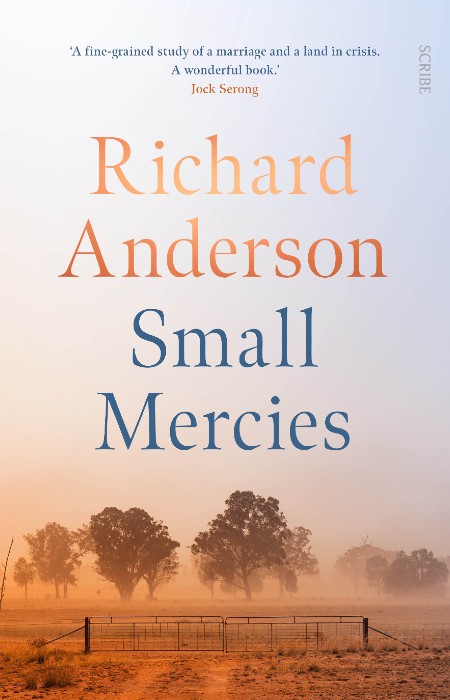
Tenacity is an amazing thing.
It speaks of the ability to face up to the very worst of things, to know how terrible and existentially exhausting they are, to know you could run away and leave an intolerable situation far behind … and yet NOT.
What propels you to hang in there and outlast the adversity, or at least give it everything you’ve got, is the idea that within and beyond the hellscape of the present lies something infinitely precious and worth hanging onto, something that matters enough to face down the horrors, though that takes its toll, and wait for the figurative sun to rise again.
In Richard Anderson’s quietly affecting Small Mercies, Dillon aka Dimple and Ruthie Travers are the living embodiment of tenacity, farmers from a drought-stricken part of Australia who have endured years of on-and-off drought, cycles of plenty and none (far too much of the latter and not nearly enough of the former) and who keep tenaciously putting one foot in front of the other because of their love for and commitment to the land.
Put like that it all sounds gloriously, inspiringly romantic, and in part it is, and yet all those years of holding the line has left the fifty-something parents of two boys exhausted down to the very fibre of their bones.
Neither of them will admit as much since the heady power of routine – cows to be tended to, hens to be looked after, fences to be fixed etc and on and on it goes – is unceasing and cannot be ignored in a world with a great many charms but very few breaks from the day-to-day burdens that will not be denied.
“As they drove down the paddock to check tanks and troughs before he took her back to the house, he didn’t look at her because he knew she would ask: ‘What?’ But he thought how she must have at least fantasised about running away with Fergus or someone like him. The kids were grown up. She’d given their marriage a fair crack. Why keep bashing at it? If you’re capable of acknowledging that you only live once, then you have to at least consider an easier option. Don’t you?” (P. 5)
With the onrushing momentum of everyday life holding them firmly in their grasp, and a cosy but somewhat dissatisfied companionship at the heart of their mostly marriage (Is it? Neither of them has really stopped to figure that out), things come to a head on a rare two-day road trip when they travel a few hours down the road to confront big agribusiness farmer Wally Oliver who has callously decried the inherent selfishness of “small farmers” on the land.
In his consolidated view of the world, the land is just another resource to be fully and systematically explored, stripped of all its romantic allure and simply jotted down as another, hopefully profitable, item on the balance sheet.
Ruthie, the more passionate and hot-headed of the couple, is determined to bring Oliver to account and convinces her far more laconic husband, who is completely and utterly at home on the land, to make the trip and strike back in an arena where they at least retain some choice and power.
Certainly, the drought has tested their ability to control their livelihood just as the demands of farming mean that they cannot take a break, cannot take a moment to themselves, having yielded control to a force that often feels bigger than they are.
Their lives of all work and no rumination come slowly apart on their trip to Oliver’s farm, which both goes as they envisaged and yet not at all, and beyond as they decide to drive to nearby towns and have rare holiday away from it all.

Anderson beautifully captures what happens to anyone who dares to down tools, real or metaphorical, and step away from their routine long enough for the stark reality of their live to manifest before them.
Small Mercies is a rich and moving portrayal, not just of a marriage at the crossroads, but of lives that have not been closely examined for years and when there is space to do so, are found wanting.
The question in this rare and vulnerable place that Dimple and Ruthie find themselves in what does it all mean?
Are the quiet, then ever-louder feelings of discontent and dissatisfaction a terminal sign of irretrievable decline or can they be arrested and turned around, used to forge a new more satisfying path?
And is their tenacity of years standing ultimately worth anything? They like to think it is, connected as deeply to the land as they are, but on that fateful road trip, which comes with some pleasure and respite despite the emotional fissures, everything that was once certain begins to feel far less so, as mortal as anything else around them.
“Dimple ordered fried eggs and bacon, like they might at home. Ruthie tried to find something strange on the menu to signify she was being impulsive and ready to throw away the old rules and try anything. But then she realised she was doing it for the sake of it and that was being fake. So she elected to have the same as Dimple, with sourdough, which seemed funny and out of place. Even though the eggs and bacon weren’t as skilfully cooked as they would have been at home, they tasted really good. Without the weight of responsibility, she thought.” (P. 89)
The story of Ruthie and Dimple is at heart one of love, tenacity and commitment but it is one told with the insightful eye of someone who knows that even in the very best of places and most wonderful of lives, there can be pain, disappointment and a lingering sense of what might have been.
Small Mercies tenderly but with great humanity and at times searing honesty, asks us to consider, just as Ruthie and Dimple are considering whether the festering and only just now acknowledges negatives of life and relationship can be countered by a renewed sense of purpose and commitment.
They are huge questions to ask, but in just 204 exquisitely told pages, Anderson answers them with truthfulness, compassion, authenticity and grace, as Dimple and Ruthie grapple with a sense that while life has been good to them and they love each other, that it may not be enough to confront climate change, a life with pressures abounding and the Goliath-like Wally Olivers of the world.
There are no easy answers, and certainly Anderson doesn’t pretend otherwise with the couple seesawing back and forth from hopeful to hopeless, from impassioned to resigned, from loved-up to estranged and back again.
Ultimately what emerges is a sense that while there are things so good and great in our life that they are worth fighting for, it is not a given that the battle will be in your favour or that the resulting outcome will be anything like you were expecting.
Small Mercies knows life is tough and that tenacity may be in vain, grounded as it is in the grim, unromantic realities of life, but it is also a clarion of hope, the kind that has seen the very worst of things and knows that giving up can seem like the only sensible option and that maybe you deserve some much-needed fun, but which also understands that while it might seem the end is nigh at times, that that may not be the end of a story which may have some way to go yet.